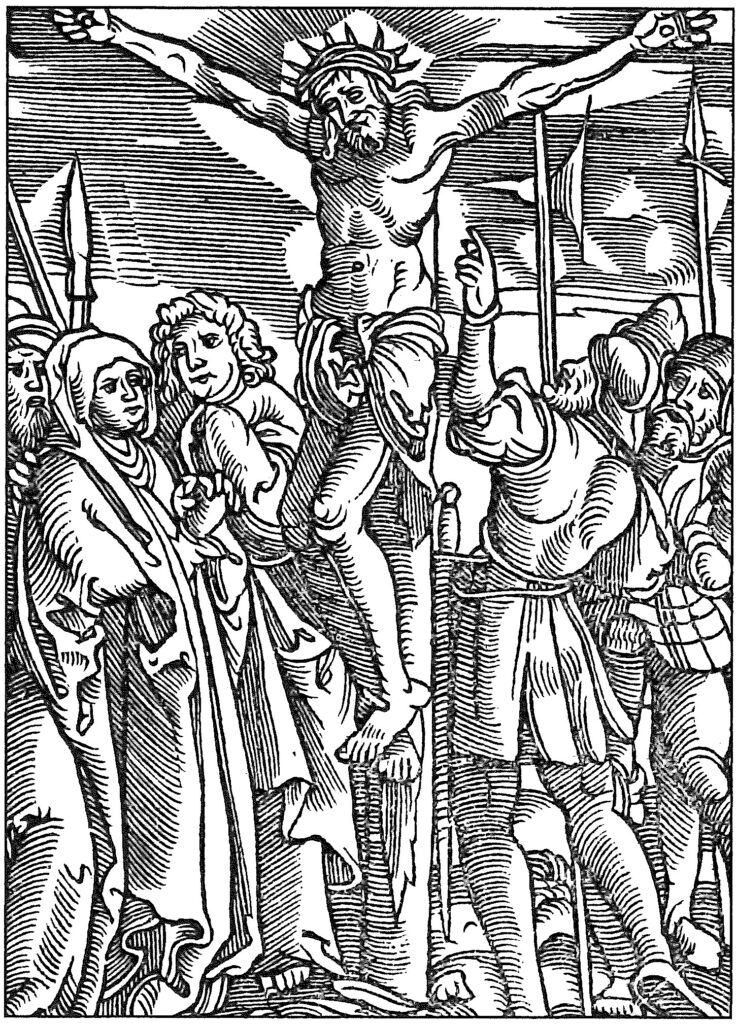
Lessons: Psalm 41, Isaiah 52:13-53:12, Hebrews 4:14-16, 5:7-9, Luke 23:33-46, John 19:25-30, Matthew 27:45-46
Hymns: LSB 531, 451, 448, 440, 447
Grace, mercy, and peace to you from God our Father and our Lord and Savior, Jesus Christ. Amen.
Jesus is speaking in Psalm 41. Enemies of Christ were seeking to kill Him, that His name would perish forever. They ridiculed and mocked Him. Even one of the Twelve would betray Him. Last night we heard Jesus say of Judas in Psalm 41:9, “Even My close friend in whom I trusted, who ate My bread, has lifted his heel against Me.” Then Jesus prayed in Psalm 41:10, “But You, O Lord, be gracious to Me, and raise Me up, that I may repay them!”
What is Jesus saying here? Is He asking His Father to raise Him from the dead that Jesus may bring about some retribution or punishment upon His enemies?
That certainly does not sound like the mind of Christ, who does everything in love, fulfilling the Law. So could there be some other explanation to these words of Jesus, “But you, O Lord, be gracious to Me, and raise Me up, that I may repay them?” Yes, in fact, there is.
Jesus begins with “But You, O Lord, be gracious to Me.” Jesus began with a “but,” meaning, “on the contrary” or “doing the opposite.” Jesus is not going to be like those who sought His death. His mind is different; He is not seeking to repay them in the same way they are treating Him. Jesus preached in His Sermon on the Mount, “You have heard that it was said, ‘An eye for an eye and a tooth for a tooth.’ But I say to you, Do not resist the one who is evil. But if anyone slaps you on the right cheek, turn to him the other also. And if anyone would sue you and take your tunic, let him have your cloak as well. And if anyone forces you to go one mile, go with him two miles. Give to the one who begs from you, and do not refuse the one who would borrow from you. You have heard that it was said, ‘You shall love your neighbor and hate your enemy.’ But I say to you, Love your enemies and pray for those who persecute you, so that you may be sons of your Father who is in heaven” (Matt. 5:38-45). And unlike other teaches, Jesus does what He says. He doesn’t teach one thing, do another, and then say, “Do as I say, not as I do.”
In Psalm 41:10, Jesus petitions His Father in Heaven to be favorable toward Him, that God would accept what Jesus is about to do. On Maundy Thursday, Jesus prayed what we call the “High Priestly Prayer” which is recorded in John 17:1-26. He began His prayer, saying, “Father, the hour has come; glorify your Son that the Son may glorify you, since you have given him authority over all flesh, to give eternal life to all whom you have given him. And this is eternal life, that they know you, the only true God, and Jesus Christ whom you have sent. I glorified you on earth, having accomplished the work that you gave me to do. And now, Father, glorify me in your own presence with the glory that I had with you before the world existed.” You can hear it in this prayer that Jesus asking His Father to be gracious to Him as He is going to the cross to be glorified.
Jesus continues His prayer in Psalm 41:10, saying, “Raise Me up, that I may repay them!”
The first thing that comes to mind when we hear Jesus say, “Raise Me up” is His resurrection. After all, in the previous psalm, Jesus spoke of His resurrection, saying, “He [God] drew Me up from the pit of destruction, out of the miry bog, and set My feet upon a rock, making My steps secure” (Psalm 40:2). It is written in Romans 6:4, “We were buried therefore with him by baptism into death, in order that, just as Christ was raised from the dead by the glory of the Father, we too might walk in newness of life.” And St. Paul also wrote, “But God, being rich in mercy, because of the great love with which he loved us, even when we were dead in our trespasses, made us alive together with Christ—by grace you have been saved—and raised us up with him and seated us with him in the heavenly places in Christ Jesus” (Eph. 2:4-6).
But the Scriptures do not always refer to the Resurrection when using words like “raise Me up” or “be lifted up.” Recall what Jesus said to Nicodemus, “As Moses lifted up the serpent in the wilderness, so must the Son of Man be lifted up, that whoever believes in Him may have eternal life” (John 3:14-15). Jesus said in John 8:28, “When you have lifted up the Son of Man, then you will know that I am He.” Also, listen to these words of Scripture as Jesus is about to begin His Passion: “[Jesus said,] ‘Now is the judgment of this world; now will the ruler of this world be cast out. And I, when I am lifted up from the earth, will draw all people to myself.’ He said this to show by what kind of death he was going to die. So the crowd answered Him, ‘We have heard from the Law that the Christ remains forever. How can You say that the Son of Man must be lifted up? Who is this Son of Man?’” (John 12:32-34).
This matches our reading from Isaiah 52:13-15, “Behold, My servant shall act wisely; He shall be high and lifted up, and shall be exalted. As many were astonished at you—His appearance was so marred, beyond human semblance, and His form beyond that of the children of mankind—so shall He sprinkle many nations.”
Jesus prayed, “O Lord, be gracious to Me, and raise Me up, that I may repay them!” It’s the same as saying, “Father, let Your favor be upon Me, and lift Me up on the cross that I may repay them!”
But what does it mean for Jesus to repay those who had been mocking Him and betraying Him? When we think about repayment for evil, we think of those who will punish wrongdoers. That’s part of the reason why God established government. Recall the words of Scripture concerning government and its role in our lives, “Let every person be subject to the governing authorities. For there is no authority except from God, and those that exist have been instituted by God. Therefore whoever resists the authorities resists what God has appointed, and those who resist will incur judgment. For rulers are not a terror to good conduct, but to bad. Would you have no fear of the one who is in authority? Then do what is good, and you will receive his approval, for he is God’s servant for your good. But if you do wrong, be afraid, for he does not bear the sword in vain. For he is the servant of God, an avenger who carries out God’s wrath on the wrongdoer. Therefore one must be in subjection, not only to avoid God’s wrath but also for the sake of conscience. For because of this you also pay taxes, for the authorities are ministers of God, attending to this very thing” (Romans 13:1-6). Government is supposed to serve as an instrument of God to be a terror to bad conduct and receive approval for good conduct. The government serves as an avenger on the wrongdoer. That’s why the government issues fines, keeps criminal records, and sentences criminals to prison.
This is the alien (or foreign) work of God. It something He must do in His justice. This also keeps us from coming up with our own punishments for the crimes of others. Our place is not that of vengeance, but of forgiveness and grace. Recall Romans 12:19, “Beloved, never avenge yourselves, but leave it to the wrath of God, for it is written, ‘Vengeance is Mine, I will repay, says the Lord.’” Jesus prophesied the destruction of Jerusalem because of the unbelief of His people. That’s also why the Assyrians conquered the Northern Kingdom, and the Babylonians conquered the Southern Kingdom.
But if you think about it, these are temporal punishments God inflicted upon His people. When Jesus said, “Raise Me up, that I may repay them,” He was not even thinking about punishment. Instead, just as He was asking His Father to be gracious to Him, so also Jesus was desiring to repay His enemies with grace. The word “repay” in Hebrew is based on the same word as the Hebrew word for “peace” (shalom). In fact, the word “repay” (shalem) in Hebrew is sometimes translated as “peace.” For example, Solomon wrote in Proverbs 16:7, “When a man’s ways please the Lord, he makes even his enemies to be at peace with him.” Jesus desired to please the Lord in all His works and in all His ways. He sought to perfectly fulfill the Law. In fact, that is exactly what he did. He even made peace with all who brought about His crucifixion, saying “Father, forgive them for they know not what they do.” He is, after all, the Prince of Peace. Jesus went to the cross to please His Father and grant us sinners peace with God. Through His payment of innocent Blood as He is lifted up on the cross, Jesus reconciles us to our Father in Heaven. He declared, “It is finished,” having fully taken away the sin of the world.
Instead of sending His righteous wrath against all mankind forever condemning them in Hell, Jesus suffered the wrath of God as He was forsaken by His Father on the cross. He was punished in our place. The repayment that He desired to offer is that of peace with God.
That is exactly what we have in Christ. No one is left to accuse us. As Christians who firmly and fully believe the entire Scriptures—as Christians who are repentant of all sin—Christ Jesus cleanses us with His Blood, covers us with His righteousness, and grants to us His peace.
You are baptized children of God, bought by the Blood of the Lamb of God. You are God’s own child. Christ Jesus is your Brother. Your identity is now found in Christ and His family. All by grace.
As the father was gracious to His Son, so also, He is gracious to you. He has repaid your sin with His grace and peace, covering you with His righteousness. Such good news on this Good Friday. Amen.
The peace of God which passes all understanding keep your hearts and minds in Christ Jesus to life everlasting. Amen.

